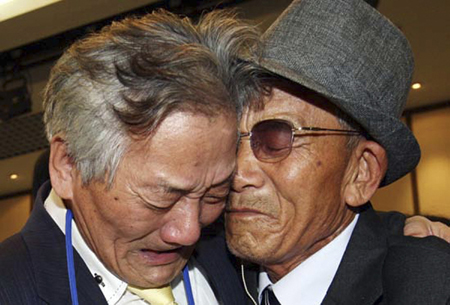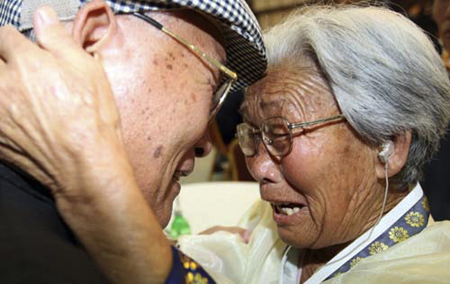Hundreds of families from the two Koreas on Saturday met at the DPRK's Mount Kumgang resort in the first government-arranged reunion since the inauguration of South Korean President Lee Myung-bak.
 |
|
South Korean Lee Jung-ho (L) cries as he meets his DPRK elder brother, who was originally from the South and was a war prisoner from South Korea during the Korean War, at the DPRK resort of Mount Kumgang September 26, 2009. [Xinhua/Reuters Photo] |
Earlier in the day, 96 South Koreans, of whom more than three-quarters were at the age of 70 or older, crossed the inter-Korean border, heading for the Kumgang resort to meet their families separated by the 1950 - 1953 Korean War.
Arriving at the DPRK's resort in the afternoon, South Koreans met with their long-separated families at a massive gathering at around 3 p.m. local time (0600 GMT), and are later to have a dining meeting in the evening.
The separate, personal meetings are scheduled to be held on Sunday.
The South Korean families will come back home on Monday after the three-day gathering, which will be followed by the second-session reunion event which will last from Tuesday to Thursday.
The reunion, which had become a semi-regular event since 2000 after a historic inter-Korean summit in Pyongyang, was suspended in 2007 with a deteriorating mood in inter-Korean relations.
 |
|
South Korean Yang Yoon-hak (L) meets his DPRK elder sister at the DPRK resort of Mount Kumgang September 26, 2009.[Xinhua/Reuters Photo] |
Saturday's family meeting, however, came as a result of an agreement reached last month between the DPRK leader Kim Jong-il and Hyun Jeong-eun, chairwoman of South Korea's Hyundai Group.
The resumption of the family meetings is regarded as conveying the DPRK's reconciliatory intentions, along with the country's recent moves including lifting a ban on cross-border traffic to and from the Kaesong Joint Industrial Park, local media said.
About 600,000 South Koreans are believed to have relatives in the DPRK. Ordinary citizens were not allowed to make phone calls, send letters or exchange e-mails across the border.
(Xinhua News Agency September 27, 2009)